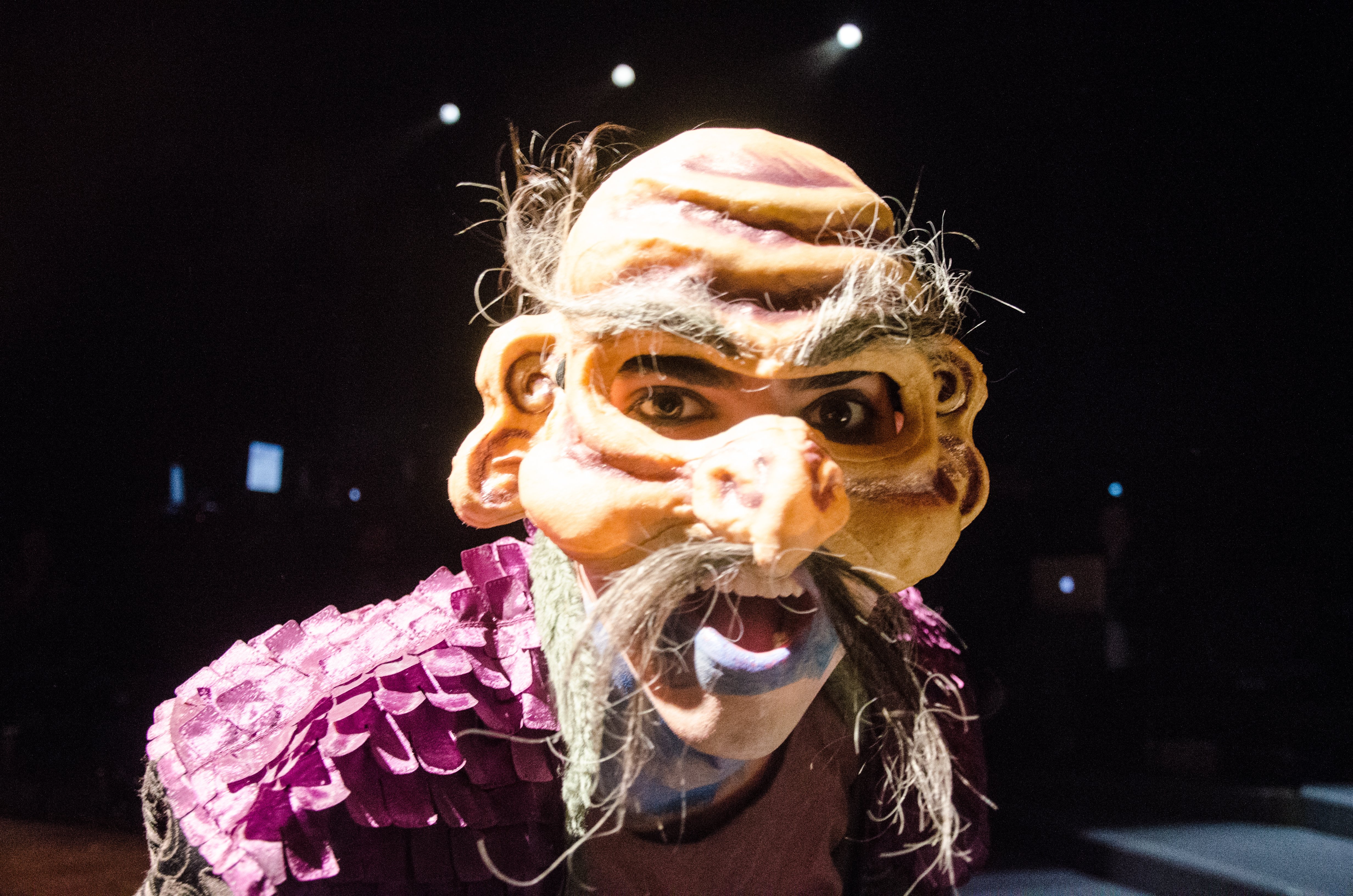
- Neon Tommy
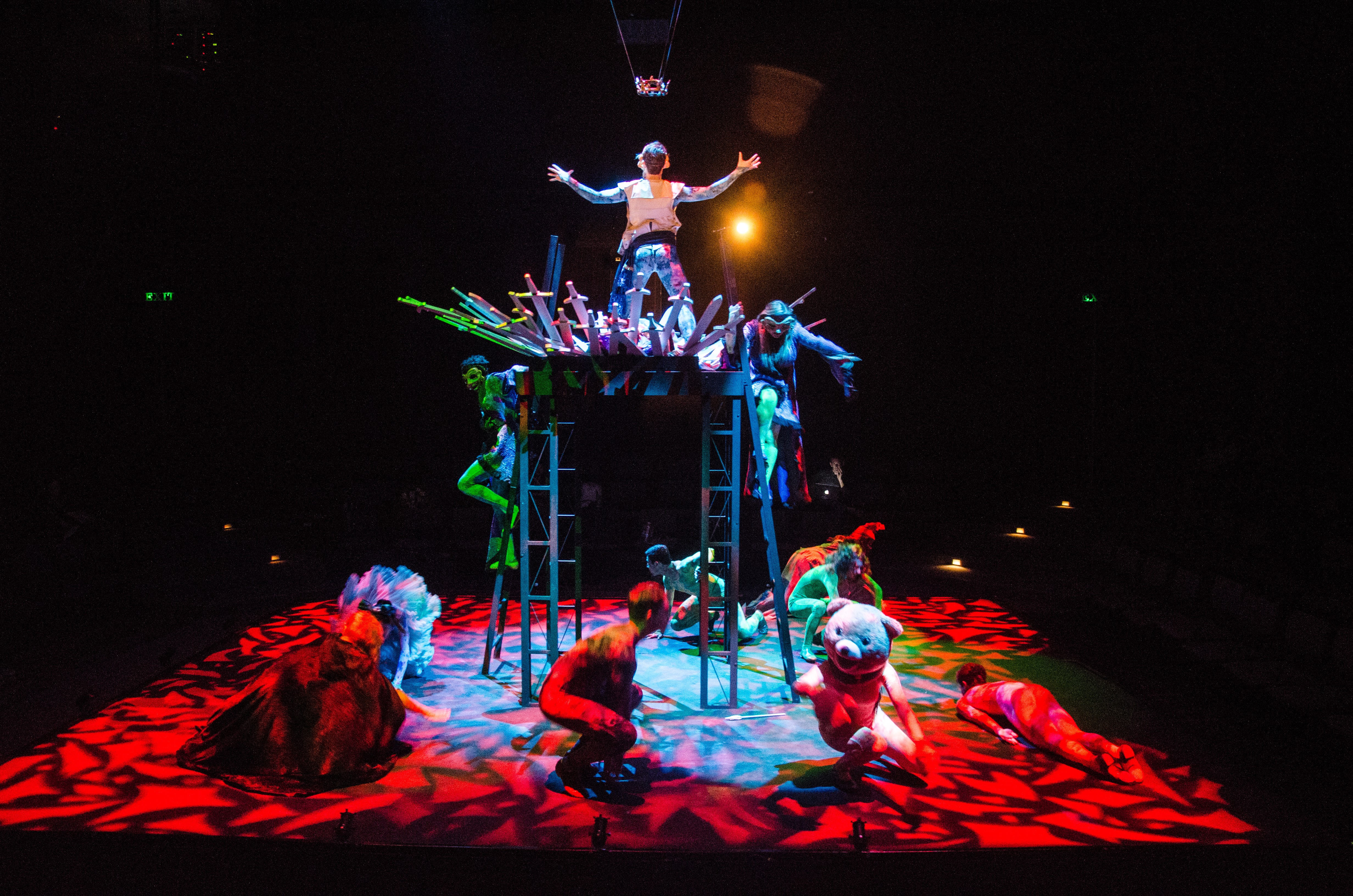
an aesthetic that was entirely unique." - LB Post
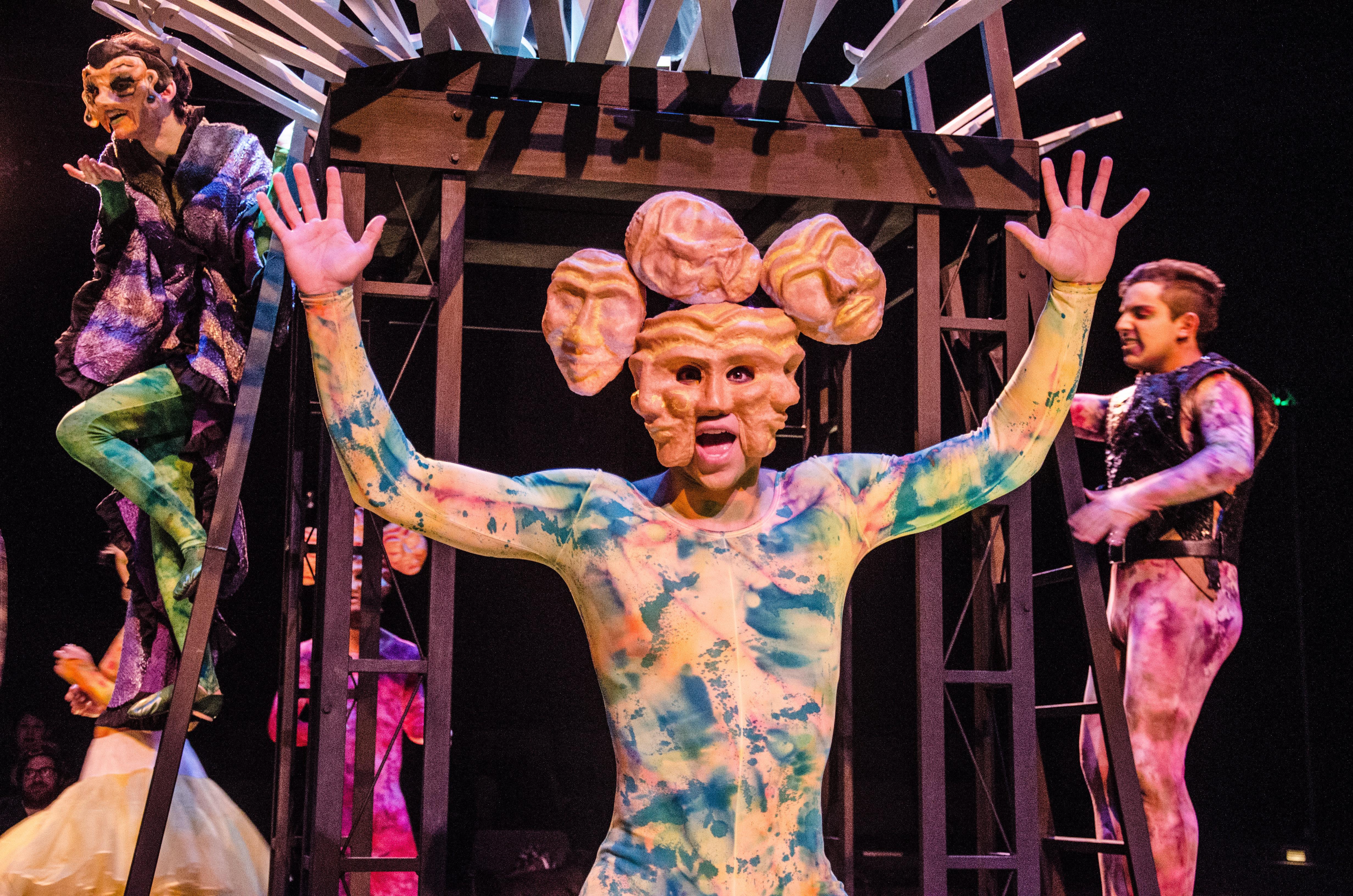
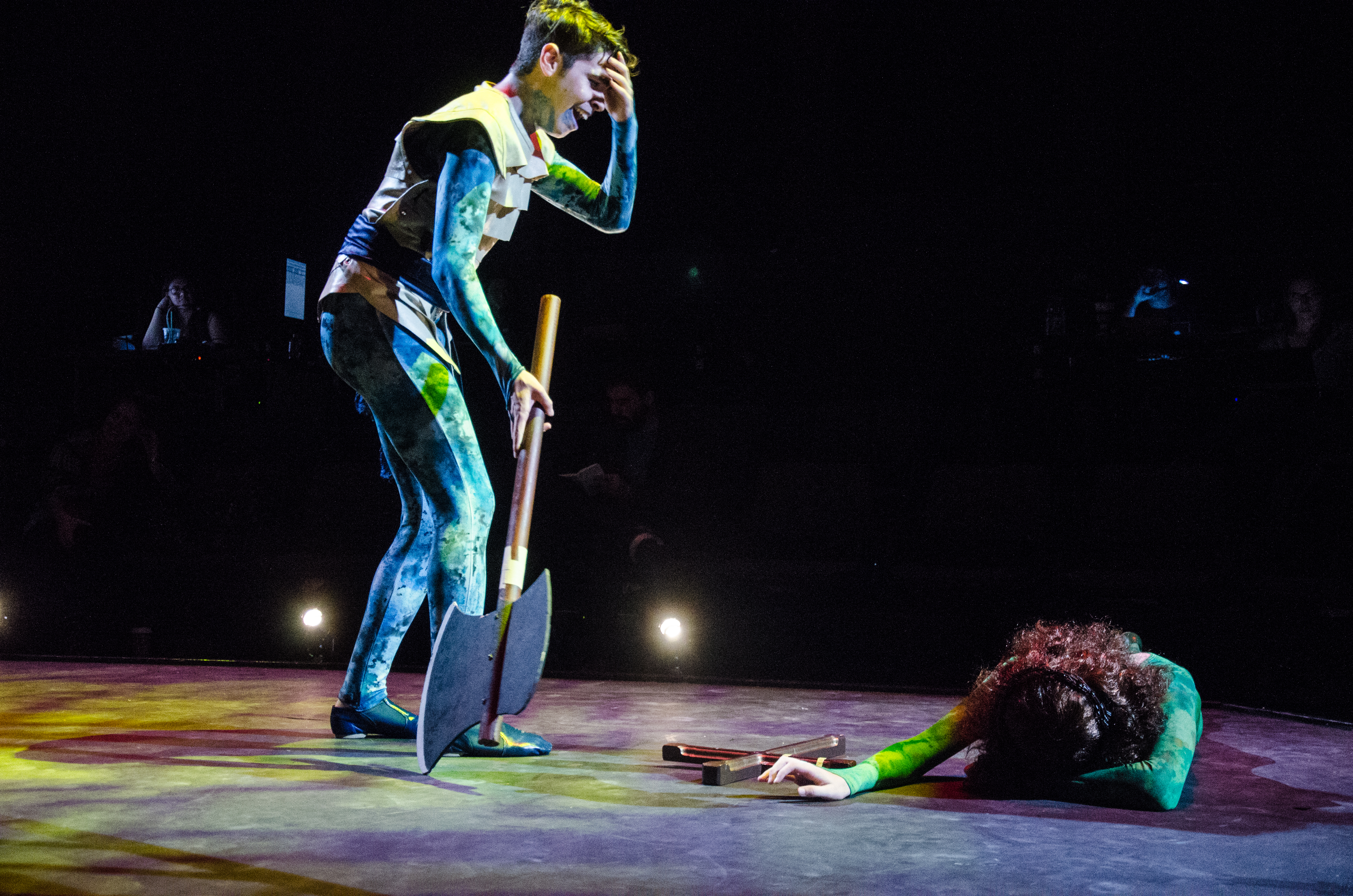
Review Plays
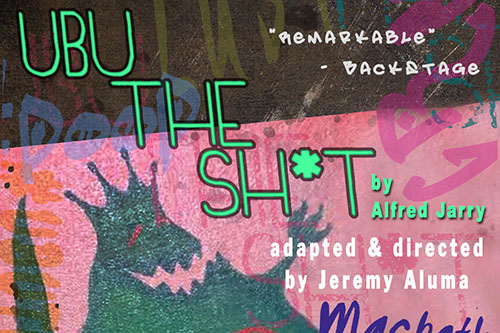





University Players presents
Ubu The Sh*t
by Alfred Jarry
adapted & directed by Jeremy Aluma
November – December 2014
at Player’s Theatre (Long Beach, CA)
“an incredibly unique theatrical experience” – Neon Tommy
“an energy that was impossible to ignore” –LB Post
“Aluma’s adaptation adroitly captures” – Grunion Gazette
“both shocking and hilarious” – Review Plays
“a lively and entertaining evening” – Random Lengths
“This play is a must see” – Daily 49er
Starring…
Rob Bergman
Tyler Bremer
Laurel Buck
Montana Bull
Jerry Campisi
Jamarr Love
Ian Martinez
Rebecca Nakano
Ammy Ontiveros
Eurico Senna
Quin Sheridan
Siri Joy Tveter
Produced by California State University at Long Beach Theatre Department, Four Clowns, Anne D’Zmura, Sara Waugh, Jeremy Aluma, and David Anis
Assistant Directors David Anis and Benji Kaufman
Musical Direction and Sound Design by Benji Kaufman
Stage Manager Gilbert Soto
Assistant Stage Managers Claire Mazzeo and Meagan Pitcher
Fight Choreography by Eric Pierce
Dance Choreography by Siri Joy Tveter
Scenic Design by Jose Rodriguez
Costume Design by Amanda Cleveland
Lighting Design by Donny Jackson
Props Mastering by Paige Bossier
Hair & Make-Up Design by Cyn Cardenas and Gillian Woodson
Graphic Design by Aryo Doh Tjojo
Company Manager Sara Waugh
Clown Trainers
Jennifer Carroll in Emotional Scale
Jamie Franta in Playfulness
Mike Funt in Mask Character
Alexis Jones in Emotional Availability
Kevin Klein in Physicality and Listening to Audience
Raymond Lee in Energy
Amir Levi in Voice
Clown Teachers
Don Colliver, Julia Davis, Dave Honigman, Turner Munch
The art of clowning is something that has deeply influenced all comedic-narrative-performing arts for about two hundred years in its most widely recognized forms. In other less specific incarnations, the clown has been around for far longer, with clowning of one kind or another dating back some four or five hundred years, and likely much further than that.
With the ability to wear their feelings on their sleeves, speak to the often unspoken truth of all situations, and exist outside of the construct of social reserve, niceties, or long term consequences, it is no wonder that the clown is an archetype that has become timeless and intrinsic to our lives. In a modern society still bogged down by conformities and projected “ethical behavior,” the thought of going through life without a care as to how you are perceived, and living instead based on how you feel, is to say the very least, enticing.
It is also a practice that is most commonly viewed as ridiculous.
The lifestyle and disposition of the fool or clown speaks simultaneously to our inner child and to our most audacious present selves, yet, these core elements of our personalities are seen as foolish or unworthy of indulging in by society. Likely, this is because they draw attention to our selfishness and perpetual, emotional-instability as a species. It is for these reasons that the clown is of so much value to us all.
To see characters with the audacity to be honest, without a care as to how that honesty will be perceived can be a rather liberating experience. Much of the success of Ubu, The Sh*t, a clown adaptation of Alfred Jarry’s absurdist French play Ubu Roi that just closed at Cal State Long Beach, got by on a lot of that liberated energy and a plethora of well-honed performances.
For clown theater to become something bigger than the sum of its entertaining and playful parts however, it requires a sense of humanity that acknowledges the tragic distance between how clowns emote on the stage and how we emote in our daily lives. Though Ubu was often great fun to watch and the student cast did a spectacular job of exploring various performance techniques, the blatant irreverence of the play as a whole, as well its willfully laissez-faire nature made much of the play’s drunken playfulness feel a bit masturbatory at times.
Jeremy Aluma, the CSULB graduate who adapted and directed this version of Ubu in collaboration with Four Clowns, a Los Angeles based but internationally recognized clown company, must at the very least be commended for their efforts here. Though the show’s adaptation veered towards the long winded and could have used some focus in its scene transitions, it did manage to create an energy that was impossible to ignore and an aesthetic that was entirely unique. The various members of the creative team must also be applauded for their efforts in those matters. This production, like nearly all I’ve seen tied to Cal State, was very handsome to look at, even at its most grotesque.
Ubu’s plot, about a ruthless and disgusting king’s unquenchable desire for all things debauched and selfish, is seemingly rather insignificant, except for setting the stage for a series of scenes that attempt to challenge our general thoughts on what would be deemed as “decent, humane behavior,” so besides that , I’ll spare you a summery. This show was not about its plot and to be honest, the more I let go of trying to understand exactly what was going on on stage, the more I was able to enjoy myself.
Four Clown’s version of Ubu was at once obscene and accessible, equal parts gleefully defiant and playfully immersive. It’s broad theatrical style and the persistently lewd subject matter encouraged the young cast to dive head first into the material and their work was universally fantastic. The majority of the lead roles changed cast members from scene to scene, creating a sort of drunken, spontaneous energy, and allowing the cast multitudes of opportunities to explore a great range of styles and possibilities. As an entertaining night out and as a learning tool for the students both cast in Ubu and viewing the performance, it proved to be an invaluable experience. As a work of lasting impact or theatrical relevance however, it left something to be desired.
Having not read the source material for Ubu, it is hard to determine exactly what the underlying message, tone, or goal this play contains in its original DNA, besides that of general, anarchistic, theatrical spectacle. It’s opening night caused a riot when it premiered in 1896 and many of those in attendance thought that they were at the forefront of something revolutionary.
In this era of theater, uptight and closed minded audiences are even more a threat to the survival of the art form than ever, and the necessity to keep young audiences engaged, rather than having the theater become a museum of its former self is all the more pressing.
If there was ever a time in the history of theater where we needed a theatrical revolution, that time is now.
Yet, while Ubu’s playfully defiant spirit and it’s plethora of penis and poop jokes remain just as funny and audacious as ever, this adaptation focused on the type of referential humor that TV shows like Family Guy have made immensely popular over the last decade, the type of humor that makes its mark momentarily and then evaporate just as quickly as they arrived. Like that one acquaintance of yours that only quotes movies and TV shows when they speak, leaving you to wonder if they really have any sense of humor or opinion of their own at all. In other words, this adaptation is not, unfortunately, the fuse with which to start that new theatrical revolution.
The production should be commended for attempting to incorporate social media as an entry point for audience interaction and for trying to make Uburelevant to a new generation of theater goers. All of its referential, sound-bite humor and pre-show Tweeting do little to elevate or add insight to the play’s cause or purposes however.
Finding ways in which to have an audience interact with a work of theater is an invaluable key to its longevity and lasting relevance. I have no doubt that eventually we will hone in on how to make this new language of interaction viable. I also have no doubt that when we do arrive at this future theater, the clown will still be there with us, making us laugh, piercing our defenses and forcing us to look inside of ourselves to recognize our truths and our follies. Till then, we have some spirited experiments to help us continue to move in the right direction. Four Clowns’s Ubu The Sh*t was one of those experiments. I came, I laughed, I contemplated the future of the theater a little bit and I even got humped by a cast member. At the end of the evening, I thought that was a pretty good place to be.
– Jonathan Ross
The recent collaboration between the CSU Long Beach Theatre Arts Department and Four Clowns, “Ubu the Sh*t,” by Alfred Jerry and adapted and directed by Jeremy Aluma, truly earns its subtitle, “Macbeth on Meth.” The show is nightmarish, disturbing, offensive, and most of all, outrageously funny.
Loosely following the plot of Shakespeare’s “Macbeth,” “Ubu the Sh*t” is centered around the ambitious and sex-crazed Pa Ubu and his wife, Ma Ubu, as they plot to murder the king and crown Pa Ubu “Emperor of the Universe and King of the World.” The show expands beyond Macbeth’s Scotland into the entire globe, which is highlighted by an eclectic range of exaggerated dialects and mocking of various cultures.
The show is performed in a clowning style, with a lot of choreography, intricate comedic bits, traditional conventions of clowning and many allusions to pop culture. Bougrelas (Tyler Bremer), the equivalent of Malcolm, the king’s son in “Macbeth,” emphasized his mourning over a lost loved one by mouthing the words to A Great Big World’s “Say Something.” Audience participation is encouraged multiple times, such as when a spectator was pulled up to execute one of Pa Ubu’s rebellious subjects in a “Hunger Games” style. Darth Vader may or may not have present at the battle for the crown. From the very opening, which features a rendition of “O Fortuna” accompanied by the cast with virtually every curse word known to man, one knows that this is not a typical play.
Another unique feature of the show is that Pa and Ma Ubu, the two leads, are played by multiple actors. It gives the characters an archetypal power and also allows the audience to see these characters played with different voices, mannerisms, and styles while still having consistent character traits. This is successfully executed largely due to Amanda Cleveland-Davey’s costume and mask design, which allows the audience to easily distinguish between characters. It also provides a whole slew of jokes in a show because part of Pa Ubu’s costume is a long, dangling green penis, which both reveals his character as a perverse slob and allows for many comedic bits.
The cast works together extremely well as an ensemble and the company was extremely well balanced, with not a weak link on stage. Dancing, singing, acrobatics, and fight choreography were executed flawlessly by the impressively versatile performers.
Benji Kaufman sound design added a lot of comedy to certain moments with a lot of contemporary references. The sound itself was crisp and blended well into the show, save for a few early or missed cues. Donny Jackson’s lighting design really adds to the nightmarish tone of some of the sequences, particularly early in the performance. While much of the show is humorous, the design elements combined with Siri Tveter’s dance choreography made the assassination of the king a very daunting, powerful reflection on the nature of power and political upheaval.
While the show may go a little long and degenerate a little into an excessive number of pop culture jokes, “Ubu the Sh*t” is an incredibly unique theatrical experience that both entertains and awes. While not for the faint of heart or those with delicate sensibilities, one can learn a lot about alternative modes of theatre and discover the fun in contemporary reflection upon an old story we are all too familiar with.
– Ryan David McRee
We wonder how many readers realize what a top-notch theater department we have right here in Long Beach.
Not only does our COTA (College of the Arts) set the standards for all 36 California State University campuses; the theater department alone has a solid reputation that stretches all the way to the East Coast — which helps explain why so many Ivy League graduates apply to study here.
Add to that superb instruction, direction, marketing and production skills — plus a professional theater (Cal Rep) in the theater art’s graduate program — and it’s easy to see why serious theater students flock to Long Beach.
Another little known fact is how many graduates are employed as actors in local productions, plus how many graduates direct them, and how many start new theaters of their own. Our mind leaps immediately to The Garage Theatre, and the Alive Theatre, which have joined forces.
And then there’s Jeremy Aluma, who helped found the Alive Theatre many years ago. When Aluma directed “Four Clowns” the first time, it included four clowns (angry, sad, nervous and mischievous), each with its own set of special clown techniques. Aluma was so impressed with his discovery of new theatrical ways to express emotions and ideas, he broke away to start his “Four Clowns” school in Los Angeles.
Which brings us, at long last, to our review of “Ubu, The Sh*t,” an Aluma adaptation of a work by Alfred Jarry called “Ubu The King” — written in 1896 at the height of what scholars have labeled “Absurdist Theater.”
But first, two more thoughts: Society has come a long way since comedian George Carlin got called on the carpet for uttering “one of seven words that must never be said in public.” In fact today, you can’t turn on the television, go to the movies, or buy a publication without seeing, hearing, or reading those seven repeatedly.
Add the long list of plays that have graphic sexual content in them, and it’s no wonder that the CSULB theater department agreed with Aluma that new, more aggressive, stage techniques would be appropriate — indeed, instructive — for anyone interested in acting.
And were they ever. From the opening scene where the ensemble entered like uncontrolled, wild animals who are shouting the F-word and the S-word over and over again to strains of “Carmina Burana,” followed by knocking down the fourth wall, it is blatantly obvious that “Ubu” will be a breakthrough experience for the cast and audience.
Everything about Jarry’s original version is foul, unpredictable, disorderly, and dangerous. There is no justification or rationale for any action except greed, power, and carnal lust — just as it is today in our present, chaotic world. And Aluma’s adaptation adroitly captures that tenor.
The risque costumes are outrageous, the music is ear-splitting rap (the kind that kids love), and each masked actor plays many in-your-face parts — too many to identify “who” is portraying “whom.” All we can name are Jamar Love, Montana Bull, Tyler Bremer, and Rob Bergman, each of whom is outstanding.
At the end of the two-hour, “let-it-all-hang-out exercise,” the cast had a unique learning experience; while some people in the sold-out audience (perhaps an older generation of theater-lovers) wished Aluma had realized a cardinal rule in play-writing, “Know when to stop! You can’t put everything you know in one production.”
– Shirle Gottlieb
Ubu The Sh*t involves clowns, sexually explicit humor, acrobatic moves, comedy, profanity, and audience participation. The basic story involves betrayal, murder and revenge, but what really makes this production unique is the way in which it is presented. Every character has a unique personality and is dressed in colorful royal garb. There is dancing and singing that is very entertaining. The energy, the acrobatics and humor in this show is reminiscent of the circus.
This production is for mature audiences, and may not appeal to all audiences, but I think it is worth seeing. I found the dialogue and sexual acts on stage to be both shocking and hilarious. The audience is encouraged to tweet information via Twitter which is used in the show. Also, ad libs really worked well with audience participation making this a very exciting theatrical experience.
– Elizabeth Lopez
Review Plays
Usually you know who is playing the starring role in whatever play you are seeing.
Hamlet?
Oh, yes, that’s whoever.
Earnest Worthing?
Of course, that’s another whoever.
But when you go to see Ubu the Sh*t (the elision is theirs, not ours), even with a program it is impossible to keep track of the players, because they are wearing masks and disguising costumes. Nine different people play the lead roles of Pa and Ma Ubu at various times.
The production, presented by the California State University Long Beach’s Theatre Department at the Studio Theatre on campus, is one play where individual performances are, intentionally, not important. The hilarious and scabrous action takes place with so many people running on and off stage that all you can do is sit back and enjoy the spectacle.
It is adapted and directed by Jeremy Aluma in collaboration with Four Clowns, of which Aluma is artistic director. The 1896 absurdist play by Alfred Jarry, which prefigured many 20th century plays (and which Aluma has adapted and directed before) is given a new twist this time around, a twist called, Twitter.
As part of the action, audience members are asked to fill in three Mad-Libs before the performance, and tweet their responses to a hashtag. The players agree on which three to use and include those as part of the performance. (A penguin was one of the answers opening night.)
Ubu the Sh*t originally was produced, for just one night, in Paris and caused a riot. (Parisians were serious theater-goers.) It is based, loosely, on a play created by Jarry and friends to satirize a hated physic professor. Ubu, the title character, is ugly and vulgar and a lot more words. Aluma has created an Ubu who is fat and scabrous, with his genitals exposed and his emotions on the same level. Ubu’s story uses a lot of Shakespeare, or at least can be compared to him, but Ubu himself is just disgusting and very funny as a result.
All nine Ubu’s use the Studio Theatre’s theater-in-the round to full effect: there is just a tangle of metal in the middle of the stage and the action comes at you from all sides, down the aisles and with so much energy it is hard to know what is happening next, and absolutely impossible to tell the actors apart. Since this is a performance featuring clown techniques and a great deal of audience participation, the story is different, — hilariously different.
The tweeting which is a part of the evening brings evening more audience involvement, since not only are audience’s tweets used in the play but audience members whose suggestions have been accepted are singled out for attention. Sometimes that attention is a little embarrassing, if you are involved, but it is always funny if you aren’t the focus of attention.
Ubu does have a plot, a combination of the story used in Macbeth and many other classic works, but really Ubu is about Jarry’s view of life: he sees everyone as being a product of their inner emotions: sex and excretion and eating are all that matter. Pa Ubu and Ma Ubu (played by Rob Bergman, Tyler Bremer, Laurel Buck, Montana Bull, Jerry Campisi, Jamarr Love, Ammy Ontiveros, Quin Sheridan and Siri Tveter at various times) are poster children for violence, for sex and for everything indecent. The play opens with an obscene chorus set to music from Carl Orff’s “Carmina Burana” and closes the same way, and that sets the stage for the rest of the evening. Pa Ubu finally gets stabbed (in his genitals) but all nine personifications of him have deserved such a fate.
Four Clowns knows how to make these characters distinctive and lively. The audience has a great time as they are brought into the play again and again, sometimes a little against their wills. It’s a lively and entertaining evening, definitely not for children (there is a lot of obscenity, mostly gleefully and gratuitous) but Ubu is no longer likely to precipitate a riot (even in Long Beach.)
– John Farrell
It is not often that Darth Vader, Jesus Christ and black-lit orgies share the same
Friday was opening night for Cal State University Long Beach alumnus Jeremy Alumna’s play, “Ubu the Sh*t.” It was a highly energized hyperbolization of pop culture that loosely followed the plotline of “Macbeth.”
The play’s references range from featured appearances from “Jesuslas,” “Maryslas” and “Josephslas,” and include the death and resurrection of Jesuslas, to a light saber duel between Darth Vader and one of the main characters, Pa Ubu.
The original play “Ubu the Sh*t” was adapted from, “Ubu Roi,” produced in 1896, which aimed to shock and horrify audience. After all, the first word of dialogue uttered was “sh-t.”
“Ubu,” though, faces the struggle of shocking attendees of today, when nothing is too obscene or off limits for entertainment value. Hearing “sh-t” is no longer necessarily shocking to an audience.
True to the original play, “Ubu” started with a musical chorus of “sh-t,” followed by a number of other profanities, worsening in shock value each time.
After the opening song set the tone, the play maintained its theme of vulgarity. The main characters, Ma and Pa Ubu, were highly sexualized, lewd and crude. Pa’s large green stuffed penis was hanging out of his pants the entire show and was the butt of many jokes.
Although funny at first, penis jokes can and did grow old. What this play brought with its vulgarity, though, was a setting appropriate to laugh at all that is inappropriate in everyday life, such as social and racial stereotypes, religion and selfie culture.
Aluma’s attempt to break the fourth wall to create audience involvement was somewhat disappointing. The script and idea were there, but the acting fell flat in this respect. Scripted breaks in character felt just that, scripted. It was not improvised enough to feel believable. It was hard to appreciate that transition when it felt so unnatural, but the attempt was appreciated.
For the most part though, the acting was impressive. Actors had to be comfortable with not only awkwardly sexual interactions with each other, but also had to improvise with audience suggestions and interactions.
The highlight of audience interaction was when someone from the audience recommended a certain character be killed with a pool noodle. This obviously threw Pa Ubu for a loop, and he was blatant about it, creating natural comic relief.
The fact that there were nine Ma and Pa Ubu’s was confusing. It wasn’t difficult to keep up with the characters, but there did not seem to be any good reason to have actors switching between the characters. Other than questionable choice of choosing to use the multiple Ma’s and Pa’s throughout the play, casting was done very well.
Actor Tyler Bremer was hands down excellent. He slipped into the character of Bougrelas seamlessly. His comedic timing and characterization of prissy throne heir was on point. Cast as one of the Ma and Pa Ubu’s, he did a good job as well, but it was hard not to visualize him as the sniveling “open-hand-slapping” mama’s boy.
Perhaps the most disappointing script decision was the limited acrobatics in the play. Towards the end there was an incredible ninja-esque fight scene in which two characters pulled amazing flips and tricks out from their arsenal. With the chaotic jumble of jokes, plot, dance scenes and sex acts, surely there was more room for more sweet acrobatics.
This play is a must see though, especially if you’re in the mood for performing arts that breaks the stuffy dramatic mold. “Ubu the Sh*t” creates a casual atmosphere of laughs for a laid back audience.
– Amy Patton